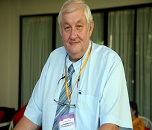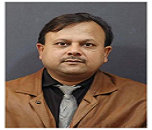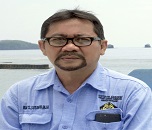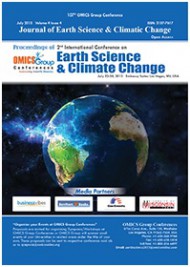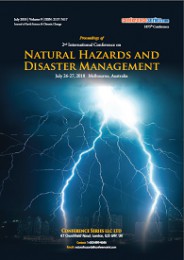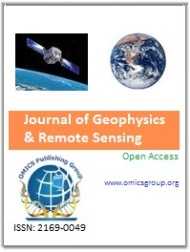Theme: Global View of Geological features and Environment for futuristic advancements
Geology-2019
ME Conferences invites all the participants across the globe to attend the 6h International Conference on Geology, Geophysics and Environmental Science which is going to be held at Helsinki, Finland during November 11-12, 2019 with the theme of “Global View of Geological features and Environment for futuristic advancements”.
ME Conferences Organizes 1000+ Global Events inclusive of 300+ International Conferences, 500+ Workshops and 200+ Symposiums every year across USA- Europe & Asia with support from 1000 more scientific societies and publishes 400+ Open access journals which contains over 30000 eminent personalities, reputed scientists as editorial board members. Geology is the science which is the scientific exploration of the planet Earth, this study deals with the physical nature and history of the earth which involves studying the materials that make up the earth, the landscapes and structures found on Earth as well as the processes that act upon them.
It is a comprehensive topic which includes its sub disciplines like geomorphology, petroleum geology, mineralogy, structural geology, environmental geology and engineering geology. Geology is the study of the Earth. It includes composition and material, structure, processes and history. We have come a long way since then, with the theories of plate tectonics explaining the position of the continents, volcanoes and earthquakes, and evolution, the fossil record we see in the rocks. The emplacement of granites and their erosion can give us a grasp of the vast span of geological time, and geologists are the scientists who find most of the world’s natural resources. Geophysics is the study of the Earth by quantitative physical methods. Environmental Science is used to diminish the reduction of natural resources, and to promote the development without causing destruction to the environment.
Geology 2019 will provide a unique scientific and technical platform to share the research experiences among the best-available experts and professionals from all over the world engaged in different fields of Geology and Environmental science. We welcome all the participants and contributors to join us at the Geology 2019 and all members of the Organizing Committee look forward to meet you in Helsinki, Finland.
Track-1: Geology & Geophysics
Geology is the study of the Earth. It includes composition and material, structure, processes and history. We have originate a elongated manner since then, with the philosophies of plate tectonics explaining the situation of the continents, volcanoes and earthquakes, and evolution, the fossil record we see in the rocks. The replacement of granites and their corrosion can give us a grip of the vast span of physical time, and geologists are the scientists who find most of the world’s natural resources. Geophysics is the study of the Earth by quantitative physical methods. It is an applied science and includes the Earth’s interior, crust, oceans, atmosphere and magnetosphere. Presentations are general and can comprise magnetic studies related to the Earth’s interaction with the Sun; plate tectonics and the interior of the Earth; petroleum and mineral exploration; environmental and engineering analyses; and even archaeological investigations. Special areas of study include the following, among others.
- Different branches of Geology
- Fundamentals of Geology
- Geological sequestration of greenhouse gases
- Geologic materials
Related Conferences: Geology Congress | Environmental Science Events | Soil Science Meetings | Earth Science Conferences
7th International Conference on Climate Change and Medical Entomology, October 15-16, 2018 Dubai, UAE. 4th International Conference on GIS & Remote Sensing, September 27-28, 2018 Berlin, Germany. 8th International Conference on Environment and Climate Change. 6th International Conference on Oceanography & Marine Biology, October 07-09, 2018 Melbourne, Australia. 3rd International Convention on Geosciences & Remote Sensing, October 19-20, 2018 Ottawa, Ontario, Canada. World Conference on Climate Change, October 4-6, 2018 London, UK. 6thInternational Conference on Geology, Geophysics & Environmental Science, November 11-12, 2019, Helsinki, Finland.
Track-2: Environmental Geology
Environmental geology is a functional science concerned with the applied submission of the principles of geology in the solving of environmental problems. It is combining or involving more than one discipline or field of study field that is closely related to engineering geology and, to a lesser extent, to environmental geography. Apiece of these fields contains the revision of the interface of humans with the geologic environment, including the biosphere, the lithosphere, the hydrosphere, and to some extent the atmosphere. Environmental geology comprises dealing environmental and hydrogeological resources such as fossil fuels, minerals, water (surface and ground water), and land use. This knowledge of the past is important because it helps them to get a better idea of what types of geologic events repeat themselves, with what frequency they might occur, and what types of damage occurred because of those events. This is different than what a paleontologist (someone who studies fossils) would do, because environmental geologists are concerned with how the past is relating to the present.
- Geological features of world
- Geological consideration of dams
- Geologic materials
- Proxy method of estimating increased pollution of environmental system
Related Conferences: Geology Congress | Environmental Science Events | Soil Science Meetings | Earth Science Conferences
7th International Conference on Climate Change and Medical Entomology, October 15-16, 2018 Dubai, UAE. 4th International Conference on GIS & Remote Sensing, September 27-28, 2018 Berlin, Germany. 8th International Conference on Environment and Climate Change. 6th International Conference on Oceanography & Marine Biology, October 07-09, 2018 Melbourne, Australia. 3rd International Convention on Geosciences & Remote Sensing, October 19-20, 2018 Ottawa, Ontario, Canada. World Conference on Climate Change, October 4-6, 2018 London, UK. 6thInternational Conference on Geology, Geophysics & Environmental Science, November 11-12, 2019, Helsinki, Finland.
Track-3: Soil and Rock Mechanics
Rock mechanics is the hypothetical and slights science of automated comportment of rock and rock mass, it is that branch of mechanics concerned with the response of rock and rock masses to force field of their physical environment. The subject of engineering rock mechanics, as applied in mining engineering practice. This castigation is strictly related to the main streams of standard mechanics and continuum mechanics. The segment affords an outline of constitutive exhibiting in geotechnical engineering. Soils are complex particulate materials whose behavior is highly non-linear and dependent on the stress state of the soil. As a result, simple calculations are insufficient to represent a soil's response to loading, and a more representative analysis (especially where accurate displacements need to be known) is required through developing a constitutive model. This module will discuss the features of constitutive models, compare them to real soil behavior, and apply them to geotechnical structures, using a combination of case studies and applied examples. The Element intentions to label and converse constitutive modelling in comparison with other modeling techniques and to discuss and analysis different constitutive models in order to select the most appropriate model for a given problem .To assess soil data and determine the required parameters for a reasonable constitutive model.
- Initial and final settlement of soil
- Identification of soil moisture defects
- Stress – Strain behavior of soil and rock
- Mechanical behavior of soils
Related Conferences: Geology Congress | Environmental Science Events | Soil Science Meetings | Earth Science Conferences
7th International Conference on Climate Change and Medical Entomology, October 15-16, 2018 Dubai, UAE. 4th International Conference on GIS & Remote Sensing, September 27-28, 2018 Berlin, Germany. 8th International Conference on Environment and Climate Change. 6th International Conference on Oceanography & Marine Biology, October 07-09, 2018 Melbourne, Australia. 3rd International Convention on Geosciences & Remote Sensing, October 19-20, 2018 Ottawa, Ontario, Canada. World Conference on Climate Change, October 4-6, 2018 London, UK. 6thInternational Conference on Geology, Geophysics & Environmental Science, November 11-12, 2019, Helsinki, Finland.
Track-4: Petroleum Geology
Petroleum geology is the revision of establishment, existence, program, gathering, and investigation of hydrocarbon energies. It states to the specific set of geological disciplines that are applied to the search for hydrocarbons (oil exploration). Petroleum geology is predominantly alarmed with the valuation of seven key features in sedimentary basins: They are source, Reservoir, seal, Trap, Timing, Maturation Migration. Any further oil migrating in from the source will escape to the surface and seep. A fold in geology is when one or a stack of originally flat and planar surfaces, such as sedimentary strata, are bent or curved as a result of deformation by compressions from liabilities and other services of landscape. There are many ways the field of geology bestows to the Petroleum Industry. The speckled corrections of geology discover the antiquity of the soil itself in hopes of understanding in greater detail where oil comes from and where more oil might be found, as well as the best ways to retrieve oil and utilize it once it has been retrieved. It is the application of geology (the study of rocks) to the exploration for and production of oil and gas.
- Elements of petroleum geology
- Biological makers in fossil fuel production
- Geological controls on hydrocarbon distribution
- Low-permeability oil field development and pressure sensitive effects
Related Conferences: Geology Congress | Environmental Science Events | Soil Science Meetings | Earth Science Conferences
7th International Conference on Climate Change and Medical Entomology, October 15-16, 2018 Dubai, UAE. 4th International Conference on GIS & Remote Sensing, September 27-28, 2018 Berlin, Germany. 8th International Conference on Environment and Climate Change. 6th International Conference on Oceanography & Marine Biology, October 07-09, 2018 Melbourne, Australia. 3rd International Convention on Geosciences & Remote Sensing, October 19-20, 2018 Ottawa, Ontario, Canada. World Conference on Climate Change, October 4-6, 2018 London, UK. 6thInternational Conference on Geology, Geophysics & Environmental Science, November 11-12, 2019, Helsinki, Finland.
Track-5: Economic Geology & Geochemistry
Economic Geology and Geochemistry syndicates the study of geology of ore deposits and geochemistry to define and appreciate the procedures of inorganic source development as well as to portion the conservational control of mineral and energy resource manipulation. Economic geology is fretful with the earth constituents that can be used for economic or engineering purposes. These resources include expensive and sordid metals, nonmetallic minerals, construction-grade stone, petroleum minerals, coal, and water. Geochemistry is the study of the distribution of chemicals in the Earth and atmosphere. Geochemistry is the systematic restraint that contracts with the qualified profusion, circulation, and movement of the Earth’s chemical elements and their elements. It is broadly concerned with the application of chemistry to virtually all aspects of geology. Copious geochemical examination is dedicated to the quantification of this abstraction of blanket material and its influence to crustal progress through geologic time in the many stages of seafloor formation and mountain building.
- Business of economic geology
- Mineral exploration design
- Organic and Inorganic Geochemistry
- Aqueous and Petroleum Geochemistry
Related Conferences: Geology Congress | Environmental Science Events | Soil Science Meetings | Earth Science Conferences
7th International Conference on Climate Change and Medical Entomology, October 15-16, 2018 Dubai, UAE. 4th International Conference on GIS & Remote Sensing, September 27-28, 2018 Berlin, Germany. 8th International Conference on Environment and Climate Change. 6th International Conference on Oceanography & Marine Biology, October 07-09, 2018 Melbourne, Australia. 3rd International Convention on Geosciences & Remote Sensing, October 19-20, 2018 Ottawa, Ontario, Canada. World Conference on Climate Change, October 4-6, 2018 London, UK. 6thInternational Conference on Geology, Geophysics & Environmental Science, November 11-12, 2019, Helsinki, Finland.
Track-6: Groundwater Foundation & Hydrology
Groundwater is the marine originate, concealed in the crashes and places in soil, sand and rock. It is deposited in and transfers gradually concluded geologic establishments of soil, sand and rocks called aquifers. Water is always on the move. After the period the earth was designed, it has been infinitely socializing through the hydrologic cycle. Groundwater is an essential measure of this unceasing cycle as water disperses, forms clouds, and proceeds to earth as rainfall. Apparent water disappears from by dynamism of the sun. The water suspension then customs clouds in the sky. Being Conditional on the high temperature and weather situations, the water vapor summarizes and sprays to the earth as different types of precipitation (rain, snow, sleet, hail). Some precipitation moves from high areas to low areas on the earth's surface and into surface water bodies. This is known as surface runoff. Once the water has joined the aquifer, it doesn’t stop there. The groundwater slowly moves through the spaces and cracks between the soil particles on its journey to lower elevations. This movement of water underground is called groundwater flow.
- Current Research in Hydrology
- Water Pollution and Water Quality
- Modelling of Watershed Systems
- Waste Water Treatment
Related Conferences: Geology Congress | Environmental Science Events | Soil Science Meetings | Earth Science Conferences
7th International Conference on Climate Change and Medical Entomology, October 15-16, 2018 Dubai, UAE. 4th International Conference on GIS & Remote Sensing, September 27-28, 2018 Berlin, Germany. 8th International Conference on Environment and Climate Change. 6th International Conference on Oceanography & Marine Biology, October 07-09, 2018 Melbourne, Australia. 3rd International Convention on Geosciences & Remote Sensing, October 19-20, 2018 Ottawa, Ontario, Canada. World Conference on Climate Change, October 4-6, 2018 London, UK. 6thInternational Conference on Geology, Geophysics & Environmental Science, November 11-12, 2019, Helsinki, Finland.
Track-7: Remote Sensing & GIS of Environment
Remote sensing of Environment appears the remote sensing unrestricted with the periodical of consequences on concept, science, applications and technology of remote sensing of earth properties and environment. Methodically interdisciplinary, this is an earthly, oceanic, and distinctive sensing. Remote sensing data provide a synoptic view of many environmental trends. Remotely recognized metaphors can afford both portraits and records over that time statement environmental issues at global, regional and national scales. It can afford these in reliable plans and in ways that balance national-level data congregation efforts, which are often under-resourced and uneven from country to country. Remote sensing can subsidize to universal valuations in sustenance of MEA’s. Remote sensing offers judicious evidence on a huge and budding numeral of conservation issues such as land-use/land-cover change, carbon-monoxide plumes, and the carbon density of ecosystems, which can significantly contribute to global environmental assessment in support of MEAs (e.g., the Inter-governmental Panel on Climate Change and the Millennium Ecosystem Assessment). GIS can mention to an integer of dissimilar machineries, developments, and devices. It is committed to many procedures and has many presentations correlated to industrial, forecasting, controlling, transference, coverage, broadcastings, and occupational.
- Applications of Remote Sensing
- Impact factor of remote sensing of environment
- Geophysical investigation of landslides
- Soil investigation methods
Related Conferences: Geology Congress | Environmental Science Events | Soil Science Meetings | Earth Science Conferences
7th International Conference on Climate Change and Medical Entomology, October 15-16, 2018 Dubai, UAE. 4th International Conference on GIS & Remote Sensing, September 27-28, 2018 Berlin, Germany. 8th International Conference on Environment and Climate Change. 6th International Conference on Oceanography & Marine Biology, October 07-09, 2018 Melbourne, Australia. 3rd International Convention on Geosciences & Remote Sensing, October 19-20, 2018 Ottawa, Ontario, Canada. World Conference on Climate Change, October 4-6, 2018 London, UK. 6thInternational Conference on Geology, Geophysics & Environmental Science, November 11-12, 2019, Helsinki, Finland.
Track-8: Oil and Gas Reservoir
Petroleum reservoir or oil and gas reservoir is a subsurface pool of hydrocarbons contained in porous or fractured rock formations. Petroleum reservoirs are broadly classified as conventional and unconventional reservoirs. In case of conventional reservoirs, the naturally occurring hydrocarbons, such as crude oil or natural gas, are trapped by overlying rock formations with lower permeability. While in unconventional reservoirs the rocks have high porosity and low permeability which keeps the hydrocarbons trapped in place, therefore not requiring a cap rock. Reservoirs are found using hydrocarbon exploration methods. Gas reservoir, in geology and natural gas production, a naturally occurring stage area, characteristically a folded rock formation such as an anticline that traps and holds natural gas and it has to be capped by impervious rock in order to form an effective seal that prevents the gas from esc. The formation of an oil or gas reservoir also requires a sedimentary basin that passes through four steps such as Deep burial under sand and mud, Pressure cooking, Hydrocarbon migration from the source to the reservoir rock and Trapping by impermeable rock.
- Petroleum formation and occurrence
- Geological condition of shale gas accumulation
- Natural Occurrence of hydrocarbons
- Types of sedimentary basins
Related Conferences: Geology Congress | Environmental Science Events | Soil Science Meetings | Earth Science Conferences
7th International Conference on Climate Change and Medical Entomology, October 15-16, 2018 Dubai, UAE. 4th International Conference on GIS & Remote Sensing, September 27-28, 2018 Berlin, Germany. 8th International Conference on Environment and Climate Change. 6th International Conference on Oceanography & Marine Biology, October 07-09, 2018 Melbourne, Australia. 3rd International Convention on Geosciences & Remote Sensing, October 19-20, 2018 Ottawa, Ontario, Canada. World Conference on Climate Change, October 4-6, 2018 London, UK. 6thInternational Conference on Geology, Geophysics & Environmental Science, November 11-12, 2019, Helsinki, Finland.
Track-9: Structural Geology
Structural Geology is the study of the three-dimensional distribution of rock units with respect to their deformational histories. The primary goal of structural geology is to use measurements of present-day rock geometries to uncover information about the history of deformation in the rocks, and ultimately, to understand the stress field that resulted in the observed strain and geometries. Structural geology is a critical part of engineering geology, which is concerned with the physical and mechanical properties of natural rocks. Structural fabrics and defects such as faults, folds, foliations and joints are internal weaknesses of rocks which may affect the stability of human engineered structures such as dams, road cuts, open pit mines and underground mines or road tunnels Environmental geologists and hydro geologists need to apply the tenets of structural geology to understand how geologic sites impact (or are impacted by) ground water flow and penetration. For instance, a hydro geologist may need to determine if seepage of toxic substances from waste dumps is occurring in a residential area or if salty water is seeping into an aquifer. Plate tectonics is a theory developed during the 1960s which describes the movement of continents by way of the separation and collision of crustal plates. It is in a sense structural geology on a planet scale, and is used throughout structural geology as a framework to analyze and understand global, regional, and local scale features.
- Orientation of geological features
- Application of structural geology
- Geological features of crustal rocks
- Tectonic forces and rock behavior
Related Conferences: Geology Congress | Environmental Science Events | Soil Science Meetings | Earth Science Conferences
7th International Conference on Climate Change and Medical Entomology, October 15-16, 2018 Dubai, UAE. 4th International Conference on GIS & Remote Sensing, September 27-28, 2018 Berlin, Germany. 8th International Conference on Environment and Climate Change. 6th International Conference on Oceanography & Marine Biology, October 07-09, 2018 Melbourne, Australia. 3rd International Convention on Geosciences & Remote Sensing, October 19-20, 2018 Ottawa, Ontario, Canada. World Conference on Climate Change, October 4-6, 2018 London, UK. 6thInternational Conference on Geology, Geophysics & Environmental Science, November 11-12, 2019, Helsinki, Finland.
Track-10: Environmental Sustainability
The main goal of Environmental Sustainability is to preserve natural resources and to develop alternate sources of power while reducing pollution towards environment. Many of the projects that are entrenched in environmental Sustainability and this may include replantation of forests, stabilizing wetlands and shielding natural areas from resources harvesting, and the major criticism of environmental sustainability is to recruits the significances that can have a probabilities with the need of a mounting commercial society. Environmental Sustainability is used to diminish the reduction of natural resources, and to promote the development without causing destruction to the environment. Geological conferences aim to inspire the young researchers, geologist, geophysicists, and geoscientist, students with the renowned speakers from 25 countries and also to bring together researchers in all aspects of Geology and related disciplines. And it may tend to endorse, inspire and influence more support, understanding and collaboration among scientists working in the field of Geology and Environmental Sustainability.
- Genotype and soil nutrient environment
- Pollution Analysis of environment
- Environmental and Geodetic Engineering
- Environmental Health Science development
Related Conferences: Geology Congress | Environmental Science Events | Soil Science Meetings | Earth Science Conferences
7th International Conference on Climate Change and Medical Entomology, October 15-16, 2018 Dubai, UAE. 4th International Conference on GIS & Remote Sensing, September 27-28, 2018 Berlin, Germany. 8th International Conference on Environment and Climate Change. 6th International Conference on Oceanography & Marine Biology, October 07-09, 2018 Melbourne, Australia. 3rd International Convention on Geosciences & Remote Sensing, October 19-20, 2018 Ottawa, Ontario, Canada. World Conference on Climate Change, October 4-6, 2018 London, UK. 6thInternational Conference on Geology, Geophysics & Environmental Science, November 11-12, 2019, Helsinki, Finland.
Track-11: Volcanology & Plate tectonics
A volcano is an opening in the earth's crust that allows molten rock from the mantle to flow out onto the surface as lava. Volcanoes also emit vast amounts of gas, primarily carbon dioxide, water vapor and sulfur dioxide. The fine solid rock particles injected into the atmosphere by an eruption can remain aloft for years. The great majority of seismicity on the planet occurs at plate boundaries, although intra-plate seismicity can occur as well when stresses build up in the plate. Volcanism is associated with two of the plate boundary types: divergent and convergent margins. The former manifest themselves as long volcanic rifts mostly in the ocean basins (ocean ridges) whereas the latter typically make individual volcanoes on the plate that "wins out" in the collision process (i.e., does not subduct). Where two plates containing continental crust at their margins collide, there is little or no volcanism (such as at the Himalaya). Occasionally, plate boundaries where plates are mostly sliding by each other can experience small amounts of volcanism as well if there is a component of extension across this boundary. Volcanism can also occur at intraplate volcanoes. These volcanoes are believed to have sources deeper down in the Earth's mantle that remain in a relatively fixed location relative to the always migrating plate boundaries. Mauna Loa and Kilauea in Hawaii are the classic examples of intraplate volcanoes. Such volcanoes can also be seismically active, particularly when volcanic structures are built up rapidly. The crust must respond to the extra load and relieves this stress through tectonic activity.
- Seismic and volcanic hazards
- Environmental impacts of volcanic eruptions
- Formation of tectonics plates
- Types of plate boundaries
Related Conferences: Geology Congress | Environmental Science Events | Soil Science Meetings | Earth Science Conferences
7th International Conference on Climate Change and Medical Entomology, October 15-16, 2018 Dubai, UAE. 4th International Conference on GIS & Remote Sensing, September 27-28, 2018 Berlin, Germany. 8th International Conference on Environment and Climate Change. 6th International Conference on Oceanography & Marine Biology, October 07-09, 2018 Melbourne, Australia. 3rd International Convention on Geosciences & Remote Sensing, October 19-20, 2018 Ottawa, Ontario, Canada. World Conference on Climate Change, October 4-6, 2018 London, UK. 6thInternational Conference on Geology, Geophysics & Environmental Science, November 11-12, 2019, Helsinki, Finland.
Track-12: Mining and Soil Exploration
Mining geology is an applied science which chains the principles of economic geology and mining engineering to the development of a defined mineral resource. Mining geologist and engineers work to develop an identified ore deposit to economically extract the ore. A mineral resource is a concentration or occurrence of material of intrinsic economic interest in or on the earth’s crust in such form, quality and quantity that there are reasonable prospects for eventual economic extraction. A geotechnical investigation will include surface exploration and subsurface exploration of a site. Sometimes, geophysical methods are used to obtain data about sites. Subsurface exploration usually involves soil sampling and laboratory tests of the soil samples retrieved. Site investigation or Soil explorations are done for obtaining the information about subsurface conditions at the site of proposed construction. Soil exploration consists of determining the profile of the natural soil deposits at the site, taking the soil samples and determining the engineering properties of soil. It also includes in-situ testing of soil.
- Heavy minerals in exploration
- Sequential exploration model
- Onshore and Offshore exploration
- Mineral exploration drilling
Related Conferences: Geology Congress | Environmental Science Events | Soil Science Meetings | Earth Science Conferences
7th International Conference on Climate Change and Medical Entomology, October 15-16, 2018 Dubai, UAE. 4th International Conference on GIS & Remote Sensing, September 27-28, 2018 Berlin, Germany. 8th International Conference on Environment and Climate Change. 6th International Conference on Oceanography & Marine Biology, October 07-09, 2018 Melbourne, Australia. 3rd International Convention on Geosciences & Remote Sensing, October 19-20, 2018 Ottawa, Ontario, Canada. World Conference on Climate Change, October 4-6, 2018 London, UK. 6thInternational Conference on Geology, Geophysics & Environmental Science, November 11-12, 2019, Helsinki, Finland.
Track-13: Marine Geology & Oceanography
Marine geology or geological oceanography is the study of the history and structure of the ocean floor. It involves geophysical, geochemical, sediment logical and paleontological investigations of the ocean floor and coastal zone. Marine geology has strong ties to physical oceanography and is focused on the physical, biological and chemical interactions that characterize earth surface environments. Carbonate geology, coastal geology, ground water shed hydrology, paleoclimatology, marine biogeochemistry, and sedimentology/stratigraphy. Emphasis on near shore processes, coastal sedimentation and erosion sedimentation control, remote sensing of environment and reefs and carbonate petrology and petrography to derive clues to past environmental changes as well as post-depositional geochemical changes to island lime stones. Marine Sedimentary Environment focused on micropaleontology, geo biology, pale-oceanography and paleoclimatology, organic and inorganic isotope biogeochemistry, marine minerals, carbonate sedimentology and the physical properties of sediments and crustal rocks. The scope of Marine Science Conferences is to create a platform for strong exchange of the recent advancement and technologies towards marine oceanography and Marine biology.
- Environmental Oceanology
- Marine Biology
- Marine Sciences and Ecology
- Physical Oceanography
Related Conferences: Geology Congress | Environmental Science Events | Soil Science Meetings | Earth Science Conferences
7th International Conference on Climate Change and Medical Entomology, October 15-16, 2018 Dubai, UAE. 4th International Conference on GIS & Remote Sensing, September 27-28, 2018 Berlin, Germany. 8th International Conference on Environment and Climate Change. 6th International Conference on Oceanography & Marine Biology, October 07-09, 2018 Melbourne, Australia. 3rd International Convention on Geosciences & Remote Sensing, October 19-20, 2018 Ottawa, Ontario, Canada. World Conference on Climate Change, October 4-6, 2018 London, UK. 6thInternational Conference on Geology, Geophysics & Environmental Science, November 11-12, 2019, Helsinki, Finland.
Track-14: Paleontology & Paleo-anthropology
It is a branch of archaeology with a human focus, which seeks to understand the early development of anatomically modern humans, a process known as hominization, through the reconstruction of evolutionary kinship lines within the family Hominidae, and working from biological evidence and cultural evidence. The field draws from and combines paleontology, biological anthropology, and cultural anthropology. As technologies and methods advance, genetics plays an ever-increasing role, in particular to examine and compare DNA structure as a vital tool of research of the evolutionary kinship lines of related species and genera. Paleontology is a rich field, imbued with a long and interesting past and an even more intriguing and hopeful future. Many people think paleontology is the study of fossils. Paleontology incorporates knowledge from biology, geology, ecology, anthropology, archaeology, and even computer science to understand the processes that have led to the origination and eventual destruction of the different types of organisms since life arose.
- Vertebrate and Invertebrate Paleontology
- Finite Element analysis in Paleontology
- Anthropology and fields of Paleoanthropology
- Anthropology and the human environment
Related Conferences: Geology Congress | Environmental Science Events | Soil Science Meetings | Earth Science Conferences
7th International Conference on Climate Change and Medical Entomology, October 15-16, 2018 Dubai, UAE. 4th International Conference on GIS & Remote Sensing, September 27-28, 2018 Berlin, Germany. 8th International Conference on Environment and Climate Change. 6th International Conference on Oceanography & Marine Biology, October 07-09, 2018 Melbourne, Australia. 3rd International Convention on Geosciences & Remote Sensing, October 19-20, 2018 Ottawa, Ontario, Canada. World Conference on Climate Change, October 4-6, 2018 London, UK. 6thInternational Conference on Geology, Geophysics & Environmental Science, November 11-12, 2019, Helsinki, Finland.
Track-15: Global Warming & Climate Change
Global warming and Climate change are often used interchangeably but have distinct meanings. Similarly, the terms weather and climate are sometimes confused, though they refer to events with broadly different spatial and timescales. Weather refers to atmospheric conditions that occur locally over short periods of time from minutes to hours or days. Familiar examples include rain, snow, clouds, winds, floods or thunderstorms. Remember, weather is local and short-term. Climate, on the other hand, refers to the long-term regional or even global average of temperature, humidity and rainfall patterns over seasons, years or decades. Remember, climate is global and long-term. Climate change refers to a broad range of global phenomena created predominantly by burning fossil fuels, which add heat-trapping gases to Earth’s atmosphere. These phenomena include the increased temperature trends described by global warming, but also encompass changes such as sea level rise; ice mass loss in Greenland, Antarctica, the Arctic and mountain glaciers worldwide; shifts in flower/plant blooming; and extreme weather events.
- Forest degradation
- Circulation of atmospheric winds
- Renewable Energy to Mitigate Climate Change
- Factors influencing Climate Change, Health & Economics
Related Conferences: Geology Congress | Environmental Science Events | Soil Science Meetings | Earth Science Conferences
7th International Conference on Climate Change and Medical Entomology, October 15-16, 2018 Dubai, UAE. 4th International Conference on GIS & Remote Sensing, September 27-28, 2018 Berlin, Germany. 8th International Conference on Environment and Climate Change. 6th International Conference on Oceanography & Marine Biology, October 07-09, 2018 Melbourne, Australia. 3rd International Convention on Geosciences & Remote Sensing, October 19-20, 2018 Ottawa, Ontario, Canada. World Conference on Climate Change, October 4-6, 2018 London, UK. 6thInternational Conference on Geology, Geophysics & Environmental Science, November 11-12, 2019, Helsinki, Finland.
Track-16: Natural Hazards & Disaster Management
It deals with several features of the assessment of hazard and risk of land sliding. This article presents a summary review and a classification of the main approaches that have been developed world-wide. The first step is the part between qualitative and quantitative methods. The first group is mainly based on the site-specific experience of experts with the susceptibility hazard determined directly in the field or by combining different index maps. The approaches of the second group are formally more rigorous. It is possible to distinguish between statistical analyses (bivariate or multivariate) and deterministic methods that involve the analysis of specific sites or slopes based on geo-engineering models. Such analyses can be deterministic or probabilistic. Among the quantitative methods discussed is the Neural Networks approach which has only recently been applied to engineering geology problems. Finally several considerations concerning the concept of acceptable risk and risk management are presented. The seismic hazard is defines as the probabilistic measure of ground shaking associated to reappearance of earthquakes. Seismic hazard maps depicts the stages of chosen ground motions that likely will not, be exceeds in specified exposure times.
- Types of Natural Disaster
- Meteorological Hazards
- Alarming alerts and Early warning systems
- Disaster Risk Management
Related Conferences: Geology Congress | Environmental Science Events | Soil Science Meetings | Earth Science Conferences
7th International Conference on Climate Change and Medical Entomology, October 15-16, 2018 Dubai, UAE. 4th International Conference on GIS & Remote Sensing, September 27-28, 2018 Berlin, Germany. 8th International Conference on Environment and Climate Change. 6th International Conference on Oceanography & Marine Biology, October 07-09, 2018 Melbourne, Australia. 3rd International Convention on Geosciences & Remote Sensing, October 19-20, 2018 Ottawa, Ontario, Canada. World Conference on Climate Change, October 4-6, 2018 London, UK. 6thInternational Conference on Geology, Geophysics & Environmental Science, November 11-12, 2019, Helsinki, Finland.
Track-17: Sedimentology Geology & Stratigraphy
Sedimentology explores the origin, transport, deposition and diagenetic alterations of the materials that compose sediments and sedimentary rocks. Stratigraphy investigates how those types of rocks are accumulated and distributed in space and time. The two disciplines are core components to other fields of geoscience research including paleobiology, geobiology, tectonics, paleoclimate, petroleum geology, Earth history, geochronology, thermo chronology, deep time paleoceanography, and basin analysis. Areas of sedimentology and stratigraphy that currently motivate the research our faculty and students include, mechanistic understanding of sediment formation, deposition, and lithification (particularly of carbonates and other chemical sedimentary rocks) analysis of terrestrial paleo-environmental records to document and constrain the evolution of Earth’s ancient climates and landscapes and integrated analysis of the regional sedimentology and sequence stratigraphy of petroleum system and reservoirs, particularly deep-water margins and unconventional resources.
- Importance of sedimentary rocks
- Principle of superposition and original horizontality
- Methods employed by sedimentologists
- Subfields of Stratigraphy
Related Conferences: Geology Congress | Environmental Science Events | Soil Science Meetings | Earth Science Conferences
7th International Conference on Climate Change and Medical Entomology, October 15-16, 2018 Dubai, UAE. 4th International Conference on GIS & Remote Sensing, September 27-28, 2018 Berlin, Germany. 8th International Conference on Environment and Climate Change. 6th International Conference on Oceanography & Marine Biology, October 07-09, 2018 Melbourne, Australia. 3rd International Convention on Geosciences & Remote Sensing, October 19-20, 2018 Ottawa, Ontario, Canada. World Conference on Climate Change, October 4-6, 2018 London, UK. 6thInternational Conference on Geology, Geophysics & Environmental Science, November 11-12, 2019, Helsinki, Finland.
Track-18: Geology in Civil Engineering
Civil engineering is the branch of engineering that deals with the design, construction & maintenance of roads, bridges, large buildings, airports, ports, subways, dams, mines and other large scale developments. For a civil engineering project to be successful, the engineers must understand the land upon which the project rests. Geologists study the land to determine whether it is stable enough to support the proposed project. They also study water patterns to determine if a particular site is prone to flooding. Some civil engineers use geologist to examine rocks for important metals, oil, natural gas and ground water. The value of geology in mining has long been known but its use in civil engineering has been recognized only in comparatively recent years. Geology provides a systematic knowledge of construction material, its occurrence, composition, durability and other properties. Example of such construction materials is building stones, road metal, clay, limestone & laterite. The knowledge of the geological work of natural agencies such as water, wind, ice and helps in planning and carrying out major civil engineering works.
- Construction of dams, tunnels, highways etc.,
- Civil and structural engineering
- Civil infrastructure and climate systems
- Advanced materials for structural engineering
Related Conferences: Geology Congress | Environmental Science Events | Soil Science Meetings | Earth Science Conferences
7th International Conference on Climate Change and Medical Entomology, October 15-16, 2018 Dubai, UAE. 4th International Conference on GIS & Remote Sensing, September 27-28, 2018 Berlin, Germany. 8th International Conference on Environment and Climate Change. 6th International Conference on Oceanography & Marine Biology, October 07-09, 2018 Melbourne, Australia. 3rd International Convention on Geosciences & Remote Sensing, October 19-20, 2018 Ottawa, Ontario, Canada. World Conference on Climate Change, October 4-6, 2018 London, UK. 6thInternational Conference on Geology, Geophysics & Environmental Science, November 11-12, 2019, Helsinki, Finland.
Track-19 Ecology & Environmental Engineering
Ecology includes the study of plant and animal populations, plant and animal communities and ecosystems. Ecosystems describe the web or network of relations among organisms at different scales of organization. Since ecology refers to any form of biodiversity, ecologists research everything from tiny bacteria's role in nutrient recycling to the effects of tropical rain forest on the Earth's atmosphere. An ecosystem service is assistance to society derived from a healthy ecosystem property or process. Robust soil quality leads to more water available for plant roots and cleaner water in streams and lakes. Enhanced soil biological activity turns organic wastes into valuable nutrients and degrades toxic elements. Ecosystem services are a way of putting a value on biodiversity by looking at what it does and how we value the function that the soil performs. Environmental engineering system can also be described as a branch of applied science and technology that addresses the issues of energy preservation, protection of assets and control of waste from human and animal activities. Furthermore, it is concerned with finding plausible solutions in the field of public health, such as waterborne diseases, implementing laws which promote adequate sanitation in urban, rural and recreational areas.
- Ecosystem management
- Watershed Ecology
- Environmental economics-sustainable services and systems
- Ecological Development
Related Conferences: Geology Congress | Environmental Science Events | Soil Science Meetings | Earth Science Conferences
7th International Conference on Climate Change and Medical Entomology, October 15-16, 2018 Dubai, UAE. 4th International Conference on GIS & Remote Sensing, September 27-28, 2018 Berlin, Germany. 8th International Conference on Environment and Climate Change. 6th International Conference on Oceanography & Marine Biology, October 07-09, 2018 Melbourne, Australia. 3rd International Convention on Geosciences & Remote Sensing, October 19-20, 2018 Ottawa, Ontario, Canada. World Conference on Climate Change, October 4-6, 2018 London, UK. 6thInternational Conference on Geology, Geophysics & Environmental Science, November 11-12, 2019, Helsinki, Finland.
Track- 20: Archaeology
Archaeology or archaeology is the study of the material remains of past human life and activities. Archaeological record consists of artefacts, architecture, bio facts or Eco facts and cultural landscapes. Archaeological investigations are a primary source of knowledge of prehistoric, ancient, and extinct culture. Archaeology can be considered both a social science and a branch of the humanities. One of the major acquirements of 19th century archaeology was the development of stratigraphy. One of the first sites to undergo archaeological excavation was Stonehenge and other megalithic monuments (structures made of such large stones) in England.
- Enlightenment era
- Megalithic monuments
- Stratigraphy
- Historical Archaeology
- Ethno-Archaeology
Related Conferences: Geology Congress | Environmental Science Events | Soil Science Meetings | Earth Science Conferences
7th International Conference on Climate Change and Medical Entomology, October 15-16, 2018 Dubai, UAE. 4th International Conference on GIS & Remote Sensing, September 27-28, 2018 Berlin, Germany. 8th International Conference on Environment and Climate Change. 6th International Conference on Oceanography & Marine Biology, October 07-09, 2018 Melbourne, Australia. 3rd International Convention on Geosciences & Remote Sensing, October 19-20, 2018 Ottawa, Ontario, Canada. World Conference on Climate Change, October 4-6, 2018 London, UK. 6thInternational Conference on Geology, Geophysics & Environmental Science, November 11-12, 2019, Helsinki, Finland.
Related Societies & Associations:
- European Geosciences Union (EGU)
- Environmental and Engineering Geophysical Society (EEGS)
- European Association of Geoscientists and Engineers (EAGE)
- Canadian Society of Exploration Geophysicists (CSEG)
- Canadian Society of Petroleum Geologists
- Central Geological Survey (CGS)
- Chinese Academy of Geological Sciences (CAGS)
- Chinese Geoscience Union (CGU)
- The Clay Minerals Society (CMS)
- American Association of Petroleum Geologists (AAPG)
- American Association of Stratigraphic Palynologists (AASP)
- American Gemological Society (AGS)
- American Geological Institute (AGI)
- American Geophysical Union (AGU)
- American Institute of Hydrology (AIH)
- American Rock Mechanics Association (ARMA)
- Arizona Geological Society (AGS)
- Asia Oceania Geosciences Society (AOGS)
- Association for Women Geoscientists (AWG)
- Association of American State Geologists (AASG)
- Association of Earth Science Editors (AESE)
- Association of Environmental & Engineering Geologists (AEG)
6th International Conference on Geology, Geophysics and Environmental Science will provide a unique scientific and technical platform to share the research experiences among the best-available experts and professionals from all over the world engaged in different fields of Geology, Geophysics and Environmental science.
Importance and Scope:
Geological survey play a crucial role in conducting earth science, hydrologic, and natural hazards investigations and providing services that will be accustomed advise, inform, and educate stakeholders concerning the importance of earth sciences publicly policy selections. Geology survey plays a crucial role within the systematic assortment of geology information for ore dressing. Geology survey is crucial in obtaining magnetic and gravitational fields of the Earth's interior and topography. Increase in investments in mining and exploration activities may be a key issue boosting the demand for geology services across the world. Rise in demand for precious metals like gold, platinum, titanium, and silver is anticipated to drive the demand for geology services within the close to future. Minerals square measure being excavated at a quicker rate across the world so as to satisfy the wants of the rising population.
Increase in Investments in Mineral & Mining Industry:
Annually growth in mining activities has the demand for geology and earth science services. Demand for geology and earth science services for extraction is forecast to extend thanks to the environmental rules obligatory by governments of many countries. Mining of precious metals like gold, copper, silver, and iron is propellant demand for geology services. Increase in mining activities within the U.S. could be a key issue answerable for the increase in investments in geology services for mineral and mining. High demand for geophysical data acquisition services and increase in investments within the mining sector for geophysical science are anticipated to propel the geology services marketplace for mineral & mining business throughout the forecast amount. Primary minerals excavated within the U.S. are copper, feldspar, lithium, silver, gold, iron ore, lead, nickel, beryllium, and Mo.
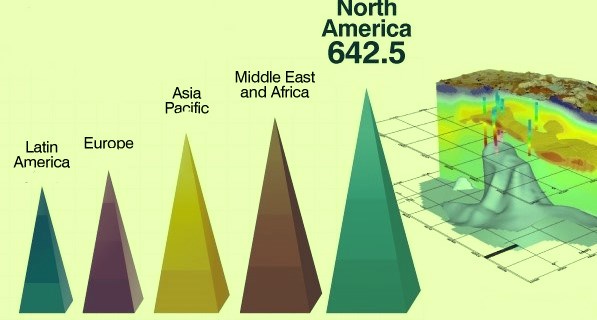
Developments & Innovations in Products and Technologies:
In February 2017, CGG was awarded a contract by Brunei Shell Petroleum for the period of six months. CGG would provide processing services for 2D, 3D and 4D seismic data acquired onshore and offshore Brunei. It would ultimately enhance CGG’s business in the Asia Pacific region. In June 2018, CGG has completed pre-stack time migration (PSTM) of a 2,500-square-kilometer survey in Block 44 of the Porcupine Basin, west of Ireland. It would ultimately create business opportunities for various companies in untapped regions. In June 2018, Dawson Geophysical Inc. was added to the Russell 2000 and Russell 3000 Indices. The Russell 2000 Index measures performance of the small-cap segment of the U.S. equity market. In February 2015, Dawson Geophysical Inc. completed strategic business collaboration with TGC Industries, Inc., a seismic data acquisition company with operations in the U.S. and Canada. This step would expand the business of Dawson Geophysical, Inc. in the next few years.
The dirt treatment market is assessed to be esteemed at USD 25.64 Billion in 2016. It is anticipated to develop at an above USD 43.65 billion in 2025 and it is anticipated to develop CAGR of 9.5% in the vicinity of 2016 and 2025. With the expanding mindfulness about sustenance security in North American, European, and Asian economies and contracting arable land, the interest for soil treatment items is relied upon to upgrade the market development sooner rather than later. The worldwide market is fragmented on the premise of its sorts into soil assurance, natural changes, and pH agents.
Conference Highlights
- Geology and Geophysics
- Environmental Geology
- Soil and Rock Mechanics
- Petroleum Geology
- Economic Geology & Geochemistry
- Groundwater Foundation & Hydrology
- Remote Sensing & GIS of Environment
- Oil and Gas Reservoir
- Structural Geology
- Environmental Sustainability
- Volcanology & Plate tectonics
- Mining and Soil Exploration
- Marine Geology & Oceanography
- Paleontology & Paleo-anthropology
- Global Warming & Climate Change
- Natural Hazards & Disaster Management
- Sedimentology Geology & Stratigraphy
- Geology in Civil Engineering
- Ecology & Environmental Engineering
- Archaeology
To share your views and research, please click here to register for the Conference.
To Collaborate Scientific Professionals around the World
| Conference Date | October 24-25, 2019 | ||
| Sponsors & Exhibitors |
|
||
| Speaker Opportunity Closed | |||
| Poster Opportunity Closed | Click Here to View | ||
Useful Links
Special Issues
All accepted abstracts will be published in respective Our International Journals.
- Journal of Earth Science & Climatic Change
- Journal of Geography & Natural Disasters
- Journal of Geology & Geophysics
Abstracts will be provided with Digital Object Identifier by



